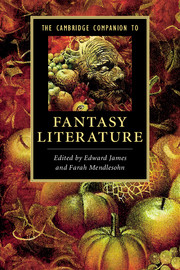Book contents
10 - Thematic criticism
from PART II - WAYS OF READING
Published online by Cambridge University Press: 28 March 2012
Summary
Thematic criticism is a form of archaeology that excavates the layers of a text and compares that text with those found in other excavations: it is almost always comparative. As such, thematic criticism can be powerful and threatening, and sometimes limited and self-limiting. Thematic criticism is not a theoretical approach to fiction in itself, but can be situated within theoretical approaches such as modernism, deconstruction, postmodernism and structuralism; it is very strongly linked to psychoanalytic and political interpretations of fantasy. It is discussed in this book because thematic criticism may be the most common approach to the literature of fantasy among both academics and fans.
Thematic criticism can focus on just one text, but is far more often deployed in comparative work, in order to create clusters of texts which can be discussed together. In a field where tropes, style, fantastical location and magical systems vary widely, thematic criticism has proved a very powerful way of creating a collectivity of texts. For example, in John Clute and John Grant's Encyclopedia of Fantasy,1 the thematic essay on reincarnation by Brian Stableford (808) or the essay on story, by John Clute (899–901) lay the basis for further exploration, offering a variety of pathways through a diverse field and demonstrating the multiplicity of pathways through individual texts, as different thematic filters open different windows into books, and different clusters emerge. The result, when thematic criticism is collected together, is a mosaic of fantasy.
The process of thematic criticism can be understood as a deconstructionist route into a text's deeper meaning, finding it richer and more meaningful than it might otherwise be read. This notion of the deeper, often metaphorical meaning in the fantastic is one of the classic defences of fantasy to the outside world.
- Type
- Chapter
- Information
- The Cambridge Companion to Fantasy Literature , pp. 125 - 133Publisher: Cambridge University PressPrint publication year: 2012
- 2
- Cited by

